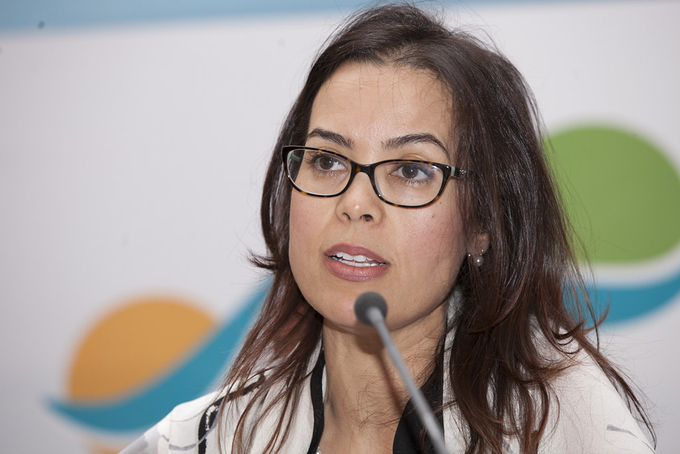May 30, 2025 | 09:30 GMT +7
May 30, 2025 | 09:30 GMT +7
Hotline: 0913.378.918
May 30, 2025 | 09:30 GMT +7
Hotline: 0913.378.918

Mr. Oscar Ortiz advises Vietnam to focus on seed structure in the coming period. Photo: Thanh Thuy.
"We are committed to continuing to promote collaboration, bringing international organizations closer to Vietnam to enhance good agricultural practices and strengthen necessary agricultural management, creating a solid foundation for the implementation of the 1 million hectares high-quality rice project in the Mekong Delta region," said Mr. Oscar Ortiz, CGIAR's Senior Director, in an interview with the Vietnam Agriculture Newspaper.
According to Mr. Ortiz, the Vietnamese government's current implementation of the 1 million hectares rice project is highly appropriate. The world is currently facing various issues such as political conflicts, climate change, which pose risks of disruptions to food and grain supply.
Vietnam has certain advantages in implementing this project, inheriting success from the VnSAT project. The project is implemented in two phases, with the first phase (from now until 2025) extending from the 182,000 hectares of the VnSAT project area.
CGIAR leadership advises that Vietnam should focus on developing new rice varieties, enhancing resistance, and being able to cope with unusual weather changes. "This is an important task, especially considering that rice is a strength of Vietnam," he emphasized.
As a globally funded agricultural research system, CGIAR has been at the forefront of many new tools and techniques to transform food production. The organization particularly prioritizes the use of more sustainable approaches, adapting to local needs in an environmentally friendly direction.
"Scientists and farmers are working together to reduce agricultural emissions while protecting food security and income. Alongside this are policy support and private sector development to bring benefits to rice businesses and farmers," added Mr. Ortiz.
Ms. Ismahane Elouafi, CGIAR's Director General, believes that to effectively implement the 1 million hectares high-quality rice project, more attention needs to be given to soil health. She shared, "The future of the planet and humanity depends on soil health. It is not only responsible for sustaining life but also for sequestering carbon, reducing pressure in the atmosphere from greenhouse gas emissions."
CGIAR representatives analyze that the global food and crop system is increasingly threatened by climate crises. In particular, 500 million small-scale farmers, providing one-third of the world's food production, live in areas particularly affected by climate shocks.
Furthermore, approximately 780 million people globally are affected by hunger, and this number is expected to significantly increase as the world warms.
Therefore, Ms. Elouafi assesses that agriculture will be at the center of finding solutions to the global climate crisis. It is also the only sector with the potential to absorb carbon. Therefore, transitioning approaches to improve soil health and sustainability is a crucial starting point.

Ms. Ismahane Elouafi, CGIAR's Director General, believes that to effectively implement the 1 million hectares high-quality rice project, more attention needs to be given to soil health.
"Better soil can help reduce emissions in agriculture and improve carbon storage. Alongside this is the support for higher crop yields, better income for farmers, and a more nutritious diet for everyone. It is also the foundation for high-quality rice areas, reducing emissions," she emphasized.
Some countries with challenging climates, harsh landscapes in dry regions such as the Middle East and North Africa, as well as Central and West Asia, have taken action to support this change. These are among the hottest regions globally, with 11 out of 17 countries facing the highest water stress.
However, through a series of solutions, focusing on four solution groups: crop diversification, regenerative practices, efficient irrigation, and monitoring systems, these countries have become exemplary in agricultural production. Israel is a notable example.
Offering advice to Vietnam in implementing the 1 million hectares high-quality rice project, Ms. Elouafi recommends considering the diversity of the food system. As we depend on very few seasonal crops, mainly rice, there is a risk of falling into international crises.
Current cultivation systems, in harsh lands, often focus on single-season planting, requiring extensive fertilizer use and depleting soil nutrients. Both practices harm the long-term development of the soil.
By diversifying crop production, farmers can significantly reduce greenhouse gas emissions. An approach recommended by CGIAR experts is rotating different crop varieties, leaving no fallow land and preventing carbon escape.
For the second approach, farmers can choose crops that require less time and irrigation, such as early-maturing legumes.
Translated by Linh Linh

(VAN) Ms. Nguyen Thi Dung, Deputy Director of Ngoc Hoang Cooperative, shared about the journey of bringing dragon fruit to Europe, achieving annual revenues in the billions of VND.

(VAN) Bamboo products from Thang Tho Bamboo Cooperative have reached many countries around the world, while also creating jobs for local workers.

(VAN) The Management Board of Con Dao National Park reported that a green sea turtle, tagged in the Philippines, has traveled thousands of kilometers to lay 84 eggs on Bay Canh Islet.

(VAN) Green technology is paving a new path for sustainable aquaculture in the Mekong Delta in particular and across the country in general, helping reduce emissions and adapt to climate change.

(VAN) On May 27, La French Tech Vietnam (the French startup and innovation community in Vietnam) held the French Tech Summit Vietnam 2025.
/2025/05/27/4731-2-223159_980.jpg)
(VAN) No votive paper, no styrofoam, no plastic bags, no plastic bottles, and no single-use plastic trays are the key rules tourists should keep in mind when visiting Con Dao.

(VAN) In the fight against plastic pollution, Vietnam has been demonstrating a proactive, pioneering, and active role in addressing the greatest environmental challenge today.